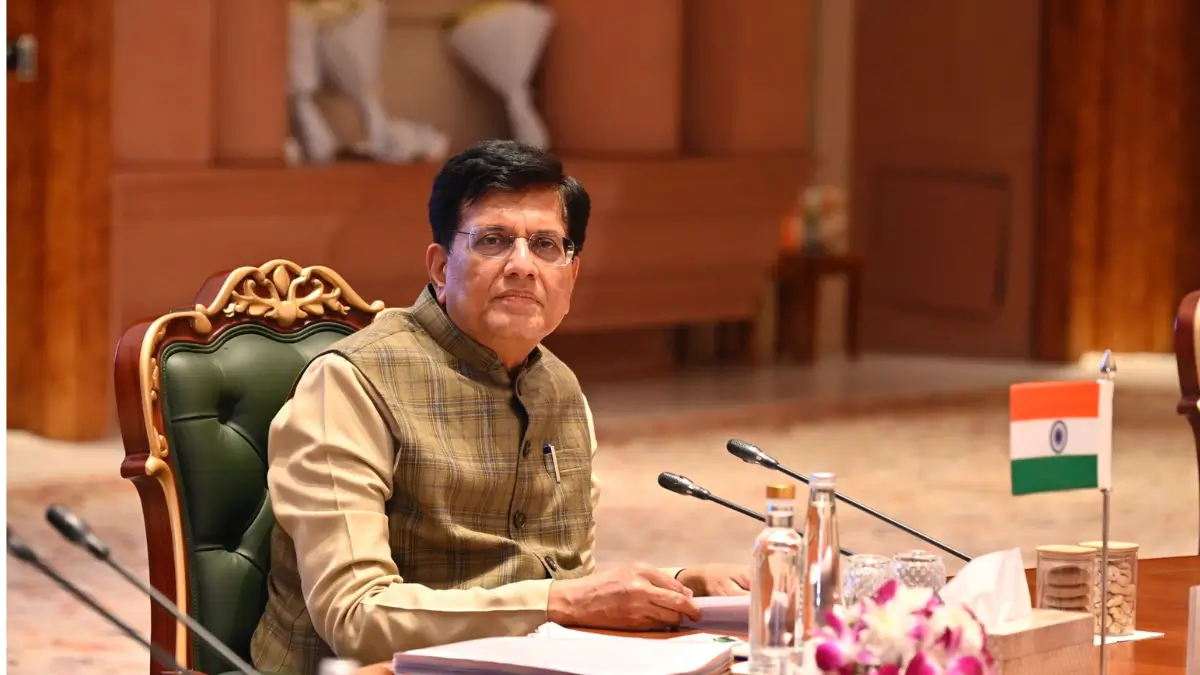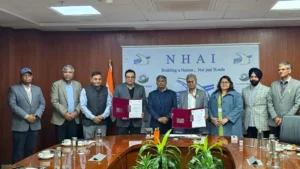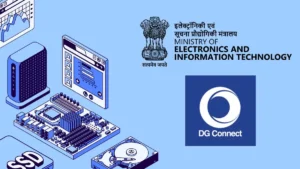India and the European Free Trade Association (EFTA) – which comprises Switzerland, Norway, Iceland, and Liechtenstein – have taken a major step towards deeper economic collaboration with the inauguration of the India-EFTA Desk. This initiative follows the successful conclusion of the India-EFTA Trade and Economic Partnership Agreement (TEPA), which positions EFTA as the first European bloc to formalize a trade pact with India. The desk will act as a critical link to ensure transparency, trust, and ease of doing business between the two regions, further enhancing their growing economic ties.
Inauguration of the India-EFTA Desk: A Landmark Initiative
The India-EFTA Desk was officially launched in New Delhi, marking the beginning of a new chapter in the economic engagement between India and EFTA countries. Union Minister for Commerce and Industry, Shri Piyush Goyal, described the TEPA as a landmark agreement that reflects India’s growing prominence in the global trade landscape. He emphasized that the India-EFTA Desk will serve as the bridge between businesses in both regions, facilitating smooth operations and ensuring a conducive business environment.
Shri Piyush Goyal noted that India aims to surpass $100 billion in EFTA investments, reflecting the nation’s commitment to fostering equitable and mutually beneficial trade relations. This desk will be a focal point for investment opportunities, trade collaborations, and technological exchange.
Supporting EFTA Businesses in India
The India-EFTA Desk will offer structured support to EFTA businesses looking to invest, expand, or establish operations in India. The desk is designed to simplify the regulatory processes, offer guidance, and help navigate the business environment in India. This initiative aims to accelerate trade exchanges, foster joint ventures, and strengthen investment flows across sectors such as technology, renewable energy, pharmaceuticals, and engineering.
EFTA’s Commitment to India
A high-ranking delegation from all four EFTA nations attended the launch, showcasing their commitment to expanding economic cooperation with India. Ms. Helene Budliger Artieda, Switzerland’s State Secretary for Economic Affairs, described TEPA as a “new chapter for investment promotion and cooperation” between the two regions. She also highlighted the $10 billion in Swiss FDI, which has created over 146,000 jobs in India, particularly in manufacturing, precision industries, and other key sectors.
Similarly, Mr. Tomas Norvoll, Norway’s State Secretary of Trade and Industry, noted that the EFTA Desk will serve as the “landing strip” for businesses aiming to expand in India. He referenced the doubling of Norwegian companies in India over the past decade, highlighting the growth of the sovereign wealth fund, now valued at $31.4 billion.
Iceland and Liechtenstein’s Economic Contributions
Iceland’s Permanent Secretary for Foreign Affairs, Mr. Martin Eyjolfsson, emphasized that TEPA is “the most significant trade agreement EFTA has signed in decades,” underscoring the importance of India’s role as a key economic partner for Europe. Iceland’s growing cooperation with India is evident in areas like renewable energy, seafood, and pharmaceuticals.
Ms. Dominique Hasler, Liechtenstein’s Minister of External Affairs, highlighted the Desk’s role in facilitating high-value manufacturing and innovation-driven industries. She pointed to the success of companies like Hilti in India, expressing optimism that more Liechtenstein-based firms will expand into India, particularly in the construction and manufacturing sectors.
Key Areas of Focus for India-EFTA Collaboration
The India-EFTA Desk will drive investments and collaborations in a range of key sectors that are central to both India’s and EFTA’s economic interests.
Technology and Innovation
One of the central pillars of India-EFTA cooperation is the exchange of expertise in technology and innovation. Both regions are keen to collaborate on advancements in artificial intelligence (AI), digital transformation, and smart manufacturing. These fields hold enormous potential for driving economic growth and technological innovation in both India and EFTA nations.
Clean Energy and Sustainability
Given India’s focus on sustainable growth, the Desk will play a crucial role in promoting renewable energy partnerships, water conservation technologies, and green technologies. EFTA countries are already leaders in sustainable solutions, and their collaboration with India will enhance the latter’s renewable energy initiatives, such as solar energy and wind power.
Healthcare and Pharmaceuticals
India and EFTA share a strong interest in the healthcare and life sciences sectors. India’s growing pharmaceutical industry and EFTA’s expertise in medical research and biotech investments will drive partnerships in pharmaceutical trade and healthcare innovations.
Agriculture and Food Security
Agriculture remains a critical area of cooperation, with EFTA’s expertise in precision agriculture and drip irrigation technologies helping India enhance its agricultural productivity. The Desk will work to expand these agriculture-based partnerships, ensuring food security and sustainable farming solutions in India.
Bilateral Trade Growth and Expanding Investments
The India-EFTA Trade and Economic Partnership Agreement (TEPA) has opened the doors for expanding bilateral trade, which has already seen a significant shift beyond traditional sectors like diamonds and precious metals. Now, trade between India and EFTA covers a wide range of sectors, including engineering goods, chemicals, electronics, defense, and agriculture.
Investment Expansion
Israeli investments in India, particularly in defense, water technology, and manufacturing, have been growing steadily. Likewise, Indian companies have been making strides in pharmaceuticals, IT, and infrastructure in EFTA countries. With TEPA in place, investment flows are expected to increase substantially.
India’s Long-Term Vision: Viksit Bharat (Developed India)
India’s ambition to become a Viksit Bharat (Developed India) by 2047 is aligned with EFTA’s economic growth objectives. The India-EFTA Desk will be pivotal in fostering long-term economic growth, technological cooperation, and investment partnerships. The collaboration will help unlock opportunities in strategic sectors, fostering an environment for innovation-driven growth.
Summary of the News
| Aspects | Details |
|---|---|
| Why in News? | India and EFTA (comprising Switzerland, Norway, Iceland, and Liechtenstein) inaugurated the India-EFTA Desk to strengthen economic collaboration following the India-EFTA Trade and Economic Partnership Agreement (TEPA). |
| Inauguration of the India-EFTA Desk | The India-EFTA Desk was launched in New Delhi to bridge business collaboration and promote mutual trade and investment between India and EFTA countries. Shri Piyush Goyal called it a landmark agreement. |
| India’s Economic Goals | India aims to surpass $100 billion in EFTA investments, emphasizing a mutually beneficial trade relationship and India’s growing role in global trade. |
| Supporting EFTA Businesses in India | The Desk will provide structured support to EFTA businesses looking to invest, expand, or set up operations in India, with a focus on simplifying regulatory processes and fostering joint ventures. |
| EFTA’s Commitment to India | High-ranking EFTA officials attended the launch, emphasizing the growth potential of Swiss FDI ($10 billion), the success of Norwegian companies in India, and Iceland’s role in renewable energy and pharmaceuticals. |
| Key Focus Areas for India-EFTA Collaboration | – Technology & Innovation: AI, digital transformation, and smart manufacturing. – Clean Energy & Sustainability: Renewable energy, water conservation. – Healthcare & Pharmaceuticals: Collaborative research and pharmaceutical trade. – Agriculture & Food Security: Precision agriculture, drip irrigation, and sustainable farming. |
| Bilateral Trade Growth | Trade between India and EFTA has expanded beyond diamonds and precious metals to include engineering goods, chemicals, electronics, defense, and agriculture. |
| Investment Expansion | Investments from EFTA countries in India are expected to increase, with key sectors including defense, water technology, and manufacturing. Similarly, Indian companies have made strides in pharmaceuticals and IT in EFTA countries. |
| India’s Long-Term Vision | India’s goal to become a Viksit Bharat (Developed India) by 2047 aligns with EFTA’s objectives. The India-EFTA Desk will be crucial in unlocking opportunities in strategic sectors and fostering long-term growth. |



 Why Bharat Container Shipping Line Could...
Why Bharat Container Shipping Line Could...
 IHMCL, NFSU Join Hands to Safeguard Digi...
IHMCL, NFSU Join Hands to Safeguard Digi...
 India, European Union Sign Key Agreement...
India, European Union Sign Key Agreement...








